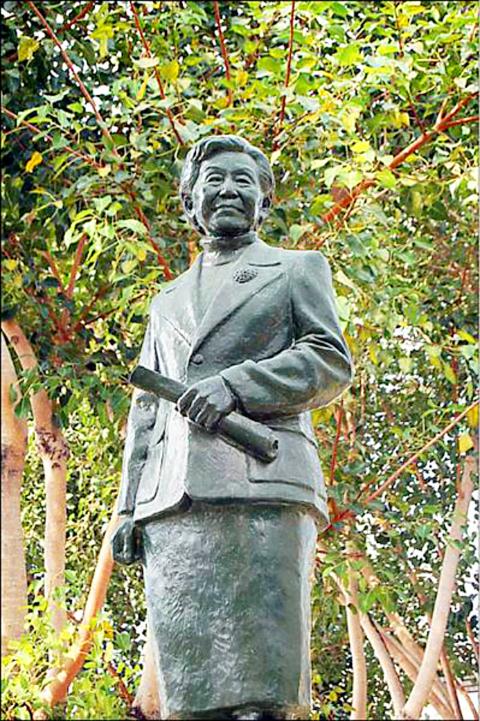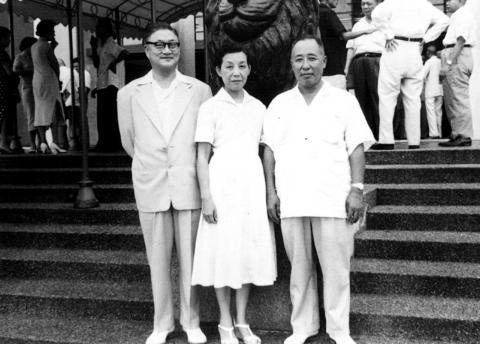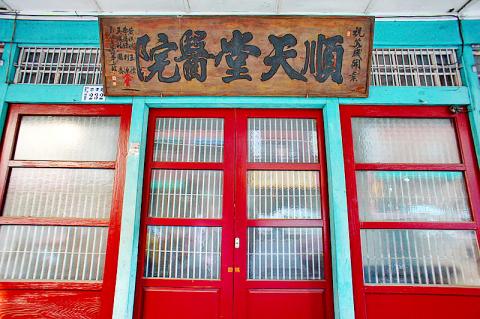June 25 to July 1
As a high school student, she confronted her Japanese principal over punishing another student who had been overheard speaking Hoklo (also known as Taiwanese) outside of school.
Decades later, Hsu Shih-hsien (許世賢) was fearlessly grilling Chinese Nationalist Party (KMT) officials as one of six Taiwan-born members of the Provincial Assembly.

Photo: Yu Hsueh-lan, Taipei Times
These six, called the “Five Dragons, One Phoenix,” were known for their firebrand questioning style and relentless pursuit of democracy and Taiwanese self-rule.
In 14 years with the assembly, Hsu proposed or co-proposed 335 motions and questioned various officials 154 times and was especially concerned about women’s rights such as adopted daughters and prostitutes.
Politics was not Hsu’s only strong suit. She also found success in medicine and education, blazing the trail for women as Taiwan’s first female doctor of medicine, high school principal, city councilor and mayor. She also founded Taiwan’s first post-war women’s association, served four consecutive terms in the provincial assembly and received the most votes in a legislative election.

Photo: Taipei Times file photo
At the end of it all, she had earned the moniker “The Matsu of Chiayi” (嘉義媽祖婆), a nickname bestowed upon individuals who dedicated their lives to helping others.
JOINING THE OPPOSITION
Born in 1908 under Japanese rule, Hsu was never shy to express her contempt toward the colonizers, reportedly getting in trouble in school for refusing to write a letter to Crown Prince Hirohito to commemorate his birthday.

Photo courtesy of WIkimedia Commons
She initially welcomed the KMT, and even toured the battlefields in China during the Chinese Civil War to boost army morale. But by early July of 1958, Hsu was one of 78 charter members of the the Chinese Local Autonomy Research Society (中國地方自治研究會), whose application was rejected by the government.
Her involvement led to her expulsion from the KMT, but in fact she had already broken ties with the party two years earlier over the suspension of then-Chiayi County Commissioner Lee Mao-sung (李茂松), who was accused of corruption.
When Hsu questioned the government — including why Lee was suspended before the court made its ruling — she was told that KMT members should not question such matters. That night, she mailed her party resignation letter and membership card to KMT headquarters, only to have it returned. This happened three times, and Hsu, fed up, ran as an independent candidate in the April 1957 Provincial Assembly elections.
Some of her talking points during this new term included adding native Taiwanese to the National Assembly, allowing people to study abroad, admitting women to the National Defense Medical Center’s doctorate program and popular elections for provincial governor to achieve democratic self-rule.
THE FAILED PARTY
The Five Dragons and One Phoenix were all reelected to office in 1960. Just a month into the new term, former KMT official Lei Chen (雷震) ran an editorial in his Free China (自由中國) magazine calling for a strong opposition party.
“Facing the KMT’s manipulation and dishonesty during elections, we need a strong opposition party to prepare for the next election to break the current situation of the KMT dominating the government. Without a healthy party system, there cannot be true democracy, and without a strong opposition party, there cannot be a healthy party system.”
The six assembly members were involved in the preparations in the ensuing months, leading to the formation of the China Democracy Party (中國民主黨) which included both China and Taiwan-born members. The plan lasted just a few months as the KMT arrested Lei and three others on Sept. 4, charging him with sedition and harboring communists.
Hsu avoided persecution and continued the fight, helping form in January 1961 an electioneering team for non-KMT candidates for the upcoming nationwide county and city council elections. She traveled Taiwan making passionate speeches, and this time the opposition shocked the establishment by winning 37.4 percent of available seats.
However, the KMT never relinquished their iron grip, using martial law and the Temporary Provisions Effective During the Period of National Mobilization for Suppression of the Communist Rebellion (動員戡亂時期臨時條款) to maintain political and social control.
After her fourth term in the assembly, Hsu was elected as mayor of Chiayi, her adopted hometown where she and her husband set up a hospital in 1940, winning the hearts of the city’s residents. But the KMT suddenly imposed an age limit of 60 for those running for local offices in an attempt to bar Hsu and other opposition heavyweights from politics.
But there was no stopping Hsu. She simply turned her focus toward the legislature, earning the most votes out of any candidate, and continued her outspoken ways. Once the age limit was lifted in 1982, Hsu ran for Chiayi mayor again, taking her last political post at the age of 74.
Hsu died a year later, but her daughters Chang Po-ya (張博雅) and Chang Wen-ying (張文英) carried on her legacy as Chiayi mayors. Chang Po-ya went on to hold many high-level government posts and currently serves as president of the Control Yuan.
Taiwan in Time, a column about Taiwan’s history that is published every Sunday, spotlights important or interesting events around the nation that have anniversaries this week.

Jacques Poissant’s suffering stopped the day he asked his daughter if it would be “cowardly to ask to be helped to die.” The retired Canadian insurance adviser was 93, and “was wasting away” after a long battle with prostate cancer. “He no longer had any zest for life,” Josee Poissant said. Last year her mother made the same choice at 96 when she realized she would not be getting out of hospital. She died surrounded by her children and their partners listening to the music she loved. “She was at peace. She sang until she went to sleep.” Josee Poissant remembers it as a beautiful

Before the last section of the round-the-island railway was electrified, one old blue train still chugged back and forth between Pingtung County’s Fangliao (枋寮) and Taitung (台東) stations once a day. It was so slow, was so hot (it had no air conditioning) and covered such a short distance, that the low fare still failed to attract many riders. This relic of the past was finally retired when the South Link Line was fully electrified on Dec. 23, 2020. A wave of nostalgia surrounded the termination of the Ordinary Train service, as these train carriages had been in use for decades

March 2 to March 8 Gunfire rang out along the shore of the frontline island of Lieyu (烈嶼) on a foggy afternoon on March 7, 1987. By the time it was over, about 20 unarmed Vietnamese refugees — men, women, elderly and children — were dead. They were hastily buried, followed by decades of silence. Months later, opposition politicians and journalists tried to uncover what had happened, but conflicting accounts only deepened the confusion. One version suggested that government troops had mistakenly killed their own operatives attempting to return home from Vietnam. The military maintained that the

Lori Sepich smoked for years and sometimes skipped taking her blood pressure medicine. But she never thought she’d have a heart attack. The possibility “just wasn’t registering with me,” said the 64-year-old from Memphis, Tennessee, who suffered two of them 13 years apart. She’s far from alone. More than 60 million women in the US live with cardiovascular disease, which includes heart disease as well as stroke, heart failure and atrial fibrillation. And despite the myth that heart attacks mostly strike men, women are vulnerable too. Overall in the US, 1 in 5 women dies of cardiovascular disease each year, 37,000 of them